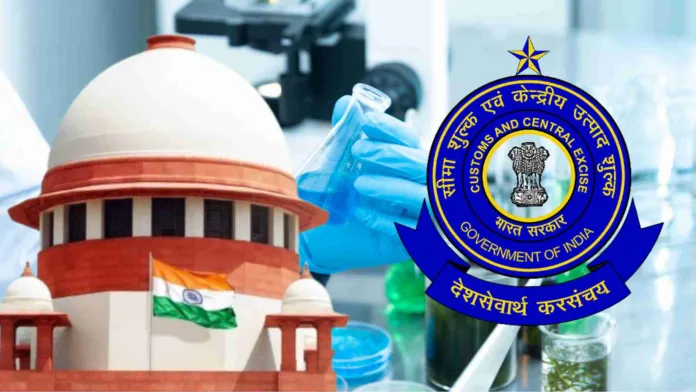The Supreme Court has directed the customs department to ensure comprehensive testing facilities for goods classification to avoid prolonged litigation.
The bench of Justice Nongmeikapam Kotiswar Singh has observed that non-examination of any product/article/goods on all the parameters laid down by the customs authority will always lead to uncertainty and doubt, which are required to be removed when dealing with confiscatory proceedings.
The bench noted that the genesis of the prolonged litigation lies in the non- availability of adequate facilities for testing all the parameters provided under Bureau of Indian Standard Specifications. A dispute could have been avoided had the testing facilities for all the parameters been available. Since the Authorities themselves had laid down the specific parameters for classification of goods, as in the present case by referring to classification under IS 1460:2005, it is incumbent upon the Authorities to ensure that necessary facilities are made available for testing of any disputed article on all these parameters as otherwise, laying down such parameters would be meaningless.
The issue involved in this batch of appeals is, whether, the imported goods is to be treated as Base Oil as claimed by the appellants or High Speed Diesel (HSD) as determined by the Customs Authorities, which is contested by the appellants.
If the product is treated as HSD, it would be a prohibited item that could not have been imported by a private entity other than a State Trading Enterprise, in which event it would be liable to be confiscated and penalty be imposed on the appellant importers.
The Commissioner of Customs, the Adjudicating Authority held that the product is not Base Oil, but HSD and accordingly, ordered confiscation of the same apart from levying penalties. On the other hand, the appellate authority, the Customs, Excise and Service Tax Appellate Tribunal (CESTAT) held the same to be Base Oil and not HSD, thus reversing the decision of the Adjudicating Authority.
On being challenged before the High Court of Gujarat, by the Customs Authorities, the High Court reversed the decision of the Appellate Tribunal and affirmed the decision of the Adjudicating Authority holding the imported goods to be HSD.
Show cause notice was also issued to the buyer, in respect of the appellant – Gastrade International Pvt. Ltd., of the earlier imported goods stating that the earlier imports were LDO under CTH 27101940 and were liable to be confiscated under Sections 111(d) and (m) of the Act and penalties were liable to be imposed under Section 112(b). Show cause notice was also issued to the exporters of the said goods as to why penalty should not be imposed on them under Sections 112(a) and (b), 114AA and 117 of the Act.
The High Court also noted that the expert was honest enough to admit that the IOC laboratory was equipped to conduct only 14 tests and it had no facility or means to conduct the remaining seven tests.
The High Court then considered whether the analysis could be said to be complete or conclusive as regards the nature of the sample only if all the 21 tests were undertaken, more particularly when the expert had asserted that all the 14 tests carried out indicated only one thing that the sample analysed was that of High Speed Diesel.
The High Court went on to observe that it is not in dispute that the onus of establishing that the sample meets the specification IS1460:2005 lay upon the Customs Authority, and the burden of proof is on the Authority to show that the particular goods or item in question is taxable in the manner claimed by them. According to the High Court, there should be material to enter an appropriate finding in that regard and the material may be either oral or documentary, and it is for the Authority to lay evidence on that behalf even before the Adjudicating Authority.
The High Court observed that if these 14 tests indicate the sample to be one of the HSD, this evidence could not have been discarded, ignored or overlooked only on the ground that seven other tests could not be undertaken by the laboratories because of lack of adequate facility to conduct these seven tests. According to the High Court, to say so would require the Department to prove its case with mathematical accuracy and beyond reasonable doubt. Accordingly, the High Court allowed the appeals preferred by the Department and set aside the order of the CESTAT.
The court noted that the oil in question does not fully satisfy the specifications of HSD in terms of IS 1460:2005. Hence, the correct test will be whether the oil/article in issue is most akin to HSD or not for which appropriate scientific evidence in the form of laboratory test reports and opinion of the scientific experts will be of utmost relevance.
The court held that non-examination of any product/article/goods on all the parameters laid down by the customs authority will always lead to uncertainty and doubt, which are required to be removed when dealing with confiscatory proceedings.
Case Details
Case Title: Gastrade International Versus Commissioner Of Customs, Kandla
Case No.: Special Leave Petition (Civil) No. 6470 Of 2022
Date: March 28, 2025
Read More: Ashok Bhasin’s Latest Thriller Gulnora Unravels a Tale of Intrigue and Corruption

